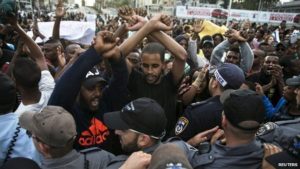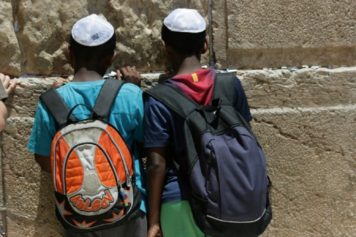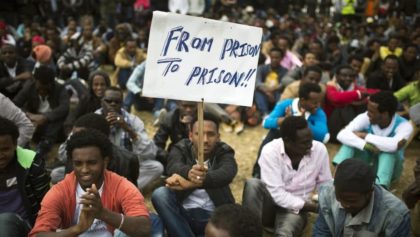#BlackLivesMatter everywhere.
This scene sounds familiar: A Black man was stopped and beaten by police, and the attack was caught on video. In response, Black people protested in the streets—not only because of the police attack on that particular man, but as a reaction to years of the systemic racial discrimination, economic marginalization and police brutality they have collectively faced. Tensions have been brewing for quite some time, and the incident was just the spark that set things off. And of course, police responded to the demonstrators with heavy-handed tactics, causing violence to erupt.
This is not Ferguson, North Charleston, Staten Island or Baltimore—this is Tel Aviv, Israel. And to be Black in Israel, not unlike America, is to be treated like a second-class citizen.
A video shows a white police officer assaulting Damas Pakada, a Black Israeli soldier in the Tel Aviv suburb of Holon. Police arrested Pakada and took him into detention overnight. He was let go after footage was released and went viral. Nevertheless, such incidents involving Ethiopians are commonplace, and one has to wonder what would have happened to the man in the absence of a video.
A May 3 protest of thousands in Tel Aviv, the nation’s capital was met with police force, including riot police, officers on horseback, water cannons and stun grenades.
Although Pakada was not killed in this incident, some Ethiopian protesters could not help but make parallels with the case of Freddie Gray, who was recently killed while in the custody of Baltimore police. As was reported in Mondoweiss, Ethiopian Israeli protesters in Jerusalem were heard yelling “Baltimore is here!” to highlight the tensions with police and the brutality to which they are subjected on a regular basis.
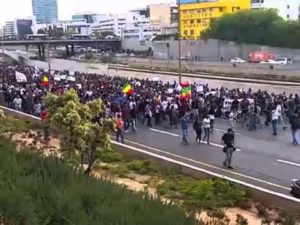
And there are other cases. Fifteen years ago, in southern Israel, Eli Malassa, 33, was accused by a police officer of stealing the army uniform he was wearing and was beaten. In 2010, Uri Muallem, 30, was pepper sprayed in the eyes by police and handcuffed while attending a family gathering. He said he spent three days in jail and was sentenced to four months of community service for attacking a police officer.
However, police abuse is merely the tip of the iceberg for Ethiopians living in Israel. Numbering at around 135,000 in a nation of 8 million people, Israelis of Ethiopian descent are the result of mass migration in the 1980s and 1990s. In 1975, Israel recognized these Ethiopians, who have been Jews for thousands of years, as Jews. And as such, they were airlifted to Israel based on Israel’s Law of Return. However, this ancient people was forced to undergo a symbolic immersion ceremony reserved only for them to prove their Jewishness.
Today, Ethiopian Jews suffer from the highest poverty rate in the country, with about half of Ethiopian families living in poverty and earning 63 cents for every dollar the rest of the population earns, according to the Ethiopian National Project, an Israeli nonprofit. In 2010, only 65 percent of Ethiopian Israelis were regularly employed, and many are subjected to exploitation and discrimination. Numerous reports of the daily injustices this population faces include being barred from clubs, buses and schools, and harassed by police amid suspicions they are undocumented immigrants, possibly Eritreans.
In 2012, after reports that landlords conspired to deny apartment rentals to Ethiopians, protesters set up a tent near the prime minister’s residence to bring attention to the discrimination Ethiopians face in Israeli society. Perhaps one of the most outrageous examples of human rights abuses came in 2013, when Israel’s health ministry investigated claims that thousands of Ethiopian women were injected with the controversial contraceptive Depo-Provera without their knowledge or consent—an alleged policy to control the Black population. In addition, in 1996, unrest ensued after news that the health ministry destroyed all blood donated by Ethiopians over fears the samples were infected with the HIV virus.
Further, in the Israeli army, one quarter of Ethiopians fail to complete their service, and soldiers of Ethiopian origin are underrepresented among military officers. Western-style, culturally insensitive testing relegates them to menial jobs, and they face segregated courses. Moreover, 40 percent of Ethiopian men in the army are sent to military prison, typically due to desertion.
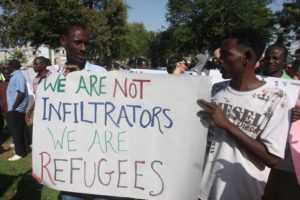
A large group of South Sudan refugees gather in Tel Aviv to Protest against the Israeli immigration policy, June 10, 2012.
Meanwhile, Prime Minister Benjamin Netanyahu met with Mr. Pakada and members of the Ethiopian community, as he should. Yet, as the Israeli leader forms his new rightwing government, he should consider his own role, and that of his Likud Party, in stoking the flames of racism.
African refugees in Israel from Sudan, Eritrea and Congo number about 47,000. Most have fled war and genocide. And rightwing Israeli politicians have demonized and scapegoated these Africans as a cancer to the country. Netanyahu has called them “illegal infiltrators” that are flooding the country, even comparing them to an Ebola plague. Hatred of Black people has been translated into policy, as some 2,200 African men are detained in an open-air desert camp, guilty of no other crime than being Black Africans and asylum seekers.
No stranger to racism, Israel has a long history of discrimination against Jews of color, including Mizrahi Jews of Arab descent, who formed their own Black Panthers civil rights movement in the 1970s to fight the social injustices, poverty, unemployment and inferior education. Non-Jewish Israeli citizens of Palestinian Arab origin are treated like second and third-class citizens, with legislation designed to marginalize and harass them.
The 100-ton elephant in the room is the occupation of the Palestinian Arabs in the West Bank and Gaza—an apartheid system that denies Palestinians their basic human rights, and keeps them imprisoned in their own country, without citizenship.
Surely, Israel is not the United States, and circumstances are not identical. However, oppression and injustice are universal constants, and the parallels are unmistakable. Throughout the African diaspora, Black people refuse to be treated like the “other” or less than a child of God. Ultimately, they find themselves protesting their condition and resisting white supremacy, whether in Ferguson or Baltimore, Jerusalem or Tel Aviv.
